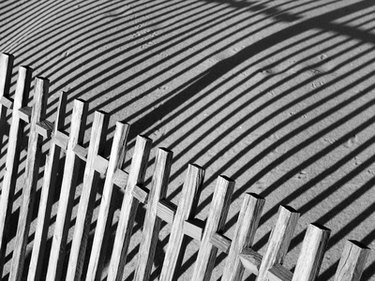Things You'll Need
Wire brush
Scraper
Metal file
Medium-grain sandpaper
Fine-grain sandpaper
Paint remover

Removing old paint before applying new paint is always the least desirable part of any fence refurbishment job. Taking a methodical approach will help make the task seem less laborious. With a few standard tools and some determination, you can brush, sand and scrape your way to a smooth, paint-ready surface.
Step 1
Brush lightly against the grain of the wood with a good-quality wire brush. (They are relatively inexpensive and long-lasting.) This will get rid of the paint flakes that are loose and already mostly detached from the fence.
Video of the Day
Step 2
Brush more intensely, but not to the point of damaging the wood.
Step 3
Brush lightly with the grain of the wood before applying more pressure, as before.
Step 4
Scrape along the grain of the wood fence using a quality scraper that has either a triangular or oval-shaped head. This will allow you to get into corners and over rounded surfaces. If using the point of the triangular head, make sure not to dig into the wood or scratch it.
Step 5
Scrape against the grain of the wood, using the same precautions as above. After a while, the head of the scraper may become blunt and ineffective. Resharpen it if necessary with a metal file.
Step 6
Sand any remaining paint with medium-grain sandpaper, moving it with the grain. Be careful not to scratch the wood.
Step 7
Use fine-grain sandpaper to sand against the grain. If you are still experiencing stubborn patches of paint, sand them so the edges are smooth enough to paint over or apply paint remover. If you use paint remover, follow the directions as to how long to leave it on before removing it with the scraper and sandpaper.
Tip
You can apply paint remover to the fence first, but unless you have a very small area of paint to remove, the cost of the paint remover may be substantial. Wear work gloves when removing paint, especially when using paint remover.
Video of the Day